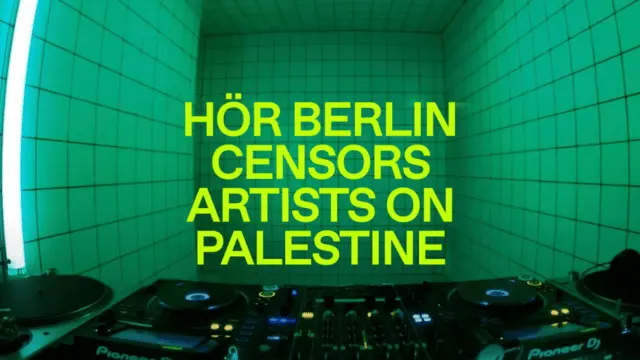HÖR Berlin Accused of Censoring DJs Wearing Palestinian T-shirt
In recent times, Berlin streaming platform HÖR Berlin has faced online criticism, sparking calls for a boycott and the removal of archived sets. The controversy revolves around allegations of pro-Israel bias, putting HÖR’s commitment to freedom of expression under scrutiny. Let’s delve into the details and examine the evolving narrative.
I. HÖR's Response to Criticism
HÖR Berlin issued a statement on November 5th, responding to the growing criticism and calls for action. The statement, directed primarily at artists in its database, aimed to clarify the platform’s stance. However, it excluded some artists, raising questions about the completeness of their communication.

II. Clarification from "HÖR Berlin" Founders
The email, seen by Resident Advisor, reveals insights from HÖR’s Israeli founders originally from Tel Aviv, addressing allegations stemming from incidents in Copenhagen and Berlin. Two artists claimed they were asked to cancel performances or alter clothing supporting Palestine, leading to accusations of censorship.
III. Specific Incidents in Question
In Copenhagen, artist Téa faced requests to remove a scarf, while in Berlin, Sam Clarke‘s set was halted due to his T-shirt displaying the Palestinian flag and Arabic text. HÖR justifies its actions by stating that these items could be perceived as offensive, alleging a call for the eradication of Israel.

IV. Public Outcry and Calls for Boycott
News of these incidents triggered a wave of protests on social media platforms. Calls for boycotting HÖR and removing archived sets gained momentum, with artists like Bored Lord, umru, DJ Voices, and EQUISS publicly expressing their concerns.
V. "HÖR Berlin" Stated Values
HÖR’s public statement on the Israel-Palestine situation on October 12th emphasized its support for the Palestinian people’s right to self-determination and freedom. However, recent events seem to contradict this stance, raising questions about the sincerity of their commitment.
VI. Freedom of Expression Dilemma
While HÖR claims to champion freedom of expression, the controversy suggests limitations based on perceived sensitivity. The line between fostering an open creative space and avoiding controversy becomes blurry, prompting reflection on the platform’s true commitment to diverse perspectives.
VII. Handling of Controversial Incidents
HÖR’s response acknowledges other controversial incidents since October 7th, admitting lapses in fact-checking and expressing regret. The platform’s pledge to enhance content moderation training hints at a recognition of the need for clearer guidelines.
VIII. Delayed Position and Community Engagement
Acknowledging the delay in articulating their position, HÖR promises to learn from the experience. The platform expresses gratitude to artists engaging in respectful dialogue, signaling an openness to community feedback and a commitment to improvement.
IX. Moving Forward and Future Challenges
As HÖR navigates this challenging period, the industry watches closely. The controversy prompts broader discussions about the responsibilities of streaming platforms in supporting diverse voices and navigating geopolitical sensitivities.
X. Conclusion
The HÖR controversy highlights the delicate balance platforms must strike between freedom of expression and cultural sensitivity. As the streaming platform grapples with its public image, the industry reflects on the evolving dynamics of creative spaces in a globalized world.
Frequently Asked Questions
The recent controversy raises questions about the alignment between HÖR’s actions and its stated commitment to freedom of expression.
Prominent artists, including Bored Lord, umru, DJ Voices, and EQUISS, have publicly expressed concerns and engaged in the boycott movement.
HÖR mentions controversial symbols without providing specific details, leaving room for interpretation and further questions.
The controversy prompts the industry to reassess the role of streaming platforms in supporting diverse perspectives and managing geopolitical sensitivities.
HÖR acknowledges lapses and pledges to enhance content moderation training, demonstrating a commitment to clearer guidelines and improved transparency.




